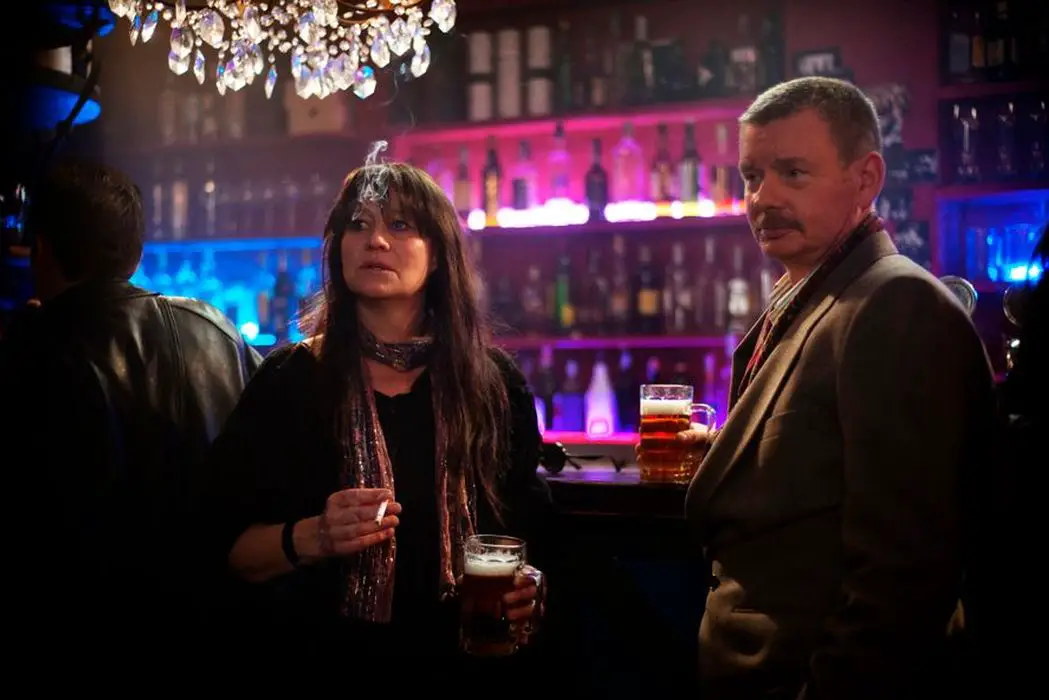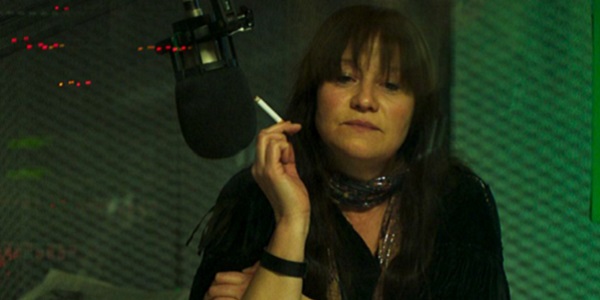Tribeca Reviews: Exploring The Anxieties Of Artists In MAPPLETHORPE & NICO, 1988

Lee Jutton has directed short films starring a killer toaster,…
This year’s Tribeca Film Festival featured two biopics of artists who thrived in the 1960s and 1970s before dying much too soon in the 1980s. That might sound so specific that you would think the films would have to be pretty similar, right? But whereas one of these films suffers from an excessiveness of conventionality in its execution, the other is a beautifully unusual formative exercise fitting of the star whose last days it chronicles.
Mapplethorpe (Ondi Timoner)
Award-winning documentary filmmaker Ondi Timoner (Dig!, We Live in Public) makes her narrative feature debut with Mapplethorpe, which chronicles the life of iconic photographer Robert Mapplethorpe from his time living in the Chelsea Hotel with Patti Smith in the early 1970s (the period covered by Smith in her brilliant, heartbreaking memoir, Just Kids) through to his death from complications of AIDS in 1989 at the age of 42.
Mapplethorpe’s beautiful portraits and photos of flowers brought him the mainstream success he needed in order to get his more controversial and now legendary work — images of graphic nudity and BDSM — displayed in major galleries. Yet no matter the subject matter, Mapplethorpe’s pure artistry shines through in every stark black-and-white frame he ever shot — even if his own father, an amateur photographer, claimed his son couldn’t be a real artist as long as he refused to develop his photos himself.

Here, Mapplethorpe is portrayed by Matt Smith, who disappears behind Mapplethorpe’s shaggy hair and Long Island accent and gives a fierce, unapologetic performance that is by far the best thing about the film. Fans of Just Kids will be disappointed that Patti Smith’s appearances in the film are brief and that she is played by the miscast Marianne Rendón, whose performance is less godmother of punk and more wistful art school ingenue. One wonders what Zosia Mamet, who was originally cast as Smith, or someone else with more of an edge, such as Tatiana Maslany, could have done with the role.
These early scenes, in which Mapplethorpe and Smith come off as painfully stereotypical hipsters who enjoy talking about being great artists more than actually doing anything, are borderline insufferable when not paired with Patti Smith’s elegiac prose from Just Kids.
Once Patti Smith disappears, and Mapplethorpe starts exploring his sexuality and meeting the men who would become his muses, patrons, and lovers, the film is markedly more engaging. But the primary problem with Mapplethorpe is that it takes the untraditional life of an art revolutionary and squishes it into the format of a traditional biopic, which doesn’t suit the legacy of Mapplethorpe at all whatsoever. It is the same issue I encountered last year when watching Tom of Finland, a biopic of another iconic gay artist. Tom of Finland too has a brilliant performance at its center, but the film itself resembles a paint-by-numbers book more than one of Tom of Finland’s stylized sketches of leather-clad, muscle-bound men.
This is also true about Mapplethorpe, which smoothly slides from one trope to another as though it feels obligated to hit certain beats along the way or else it won’t be complete. We don’t get enough time to soak up the emotional intensity of any one moment before we are carried off again to the next. The majority of the performances, especially Matt Smith’s, make the journey worthwhile, but one comes away having expected more. There is a spark missing from Mapplethorpe that one is better off seeking out in one of his photographs.
Nico, 1988 (Susanna Nicchiarelli)
Some of the best biopics in recent memory have chosen to focus on one pivotal moment or period of time in a public figure’s life, as opposed to trying to fit everything in — think Selma’s portrait of Martin Luther King, Jr. on the verge of that historic march, Capote’s in-depth exploration of the author’s time writing In Cold Blood, or The Imitation Game’s chronicle of Alan Turing’s code breaking activities during World War II. None of these films attempt to tell the entire life story of their legendary subject; rather, they zero on moments that defined these people for the rest of their lives, even if they aren’t necessarily the ones we primarily associate with them today, to explore sides of them that we may not have been privileged to see before.
In Nico, 1988, writer-director Susanna Nicchiarelli focuses on the last two years in the life of Christa Päffgen, alias Nico – the singer and model who became famous in the 1960s as one of Andy Warhol’s superstars and for lending her distinctive, husky vocals to The Velvet Underground’s debut album. But by 1986, when Nicchiarelli’s film begins, Nico is pushing 50, addicted to heroin, desperate to secure custody of her son, and dealing with interviewers who still only want to talk about The Velvet Underground when she has been a solo artist for years. Two years later, in 1988, Nico died of a heart attack while riding her bike at the age of 49.

At the outset of the film, Nico moves into an apartment in Manchester and begins touring Europe with the help of her new manager, a British club promoter named Richard. Her burning desire to outrun the ghosts of her turbulent youth and be seen as an artist on her own terms — not to mention her increased reliance on drugs — make her just as irascible as she is brilliant. Her self-destructive behavior and tendency to blow up at members of her band are painful and frustrating to watch, but when she turns it on — as she does during a fiery secret performance of her hit song “My Heart is Empty” in Prague — the aging star shines as brightly, if not more so, than she did as a beautiful young chanteuse.
Nico comes to life in an absolutely electric performance by renowned Danish actress and musician Trine Dyrholm, who herself rose to fame as a teenager when she placed third in a Danish music competition. Dyrholm is now 46 — almost exactly the same age that Nico was in 1986 — and one can easily see the influence of Dyrholm’s lifetime of stardom in Nico’s moments of world-weary melancholy. It’s absolutely pitch-perfect casting, right down to Dyrholm’s rendition of Nico’s iconic throaty voice. John Gordon Sinclair also gives a standout performance as Richard, the manager who is so infatuated with Nico that he puts up with all of her erraticness and addiction and continues to push her to perform. It is the very definition of a supporting performance, rich in sympathy and bittersweet sadness.

Throughout the film, Nico’s past is only referred to fleetingly, in conversations or in flashes of dreamlike imagery that seem unwillingly summoned from the very depths of Nico’s tortured mind. Nicchiarelli shows us how these memories made Nico the woman she was at the end of her life while also reminding us that she was so much more than them. This storytelling technique is a bold but fitting way to pay tribute to such a singular artist, and as a result, it absolutely succeeds in a way that Mapplethorpe does not. Nico, 1988 shows us how extraordinary the biopic can be when it is freed from unnecessary restrictions to embrace the idiosyncrasies of its subject.
Does content like this matter to you?
Become a Member and support film journalism. Unlock access to all of Film Inquiry`s great articles. Join a community of like-minded readers who are passionate about cinema - get access to our private members Network, give back to independent filmmakers, and more.
Lee Jutton has directed short films starring a killer toaster, a killer Christmas tree, and a not-killer leopard. Her writing has appeared in publications such as Film School Rejects, Bitch: A Feminist Response to Pop Culture, Bitch Flicks, TV Fanatic, and Just Press Play. When not watching, making, or writing about films, she can usually be found on Twitter obsessing over soccer, BTS, and her cat.













